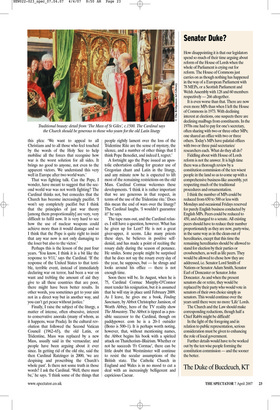Senator Duke?
How disappointing it is that our legislators spend so much of their time arguing about reform of the House of Lords when the whole of Parliament is crying out for reform. The House of Commons just carries on as though nothing has happened in the way of a European Parliament with 78 MEPs, or a Scottish Parliament and Welsh Assembly with 128 and 60 members respectively — 266 altogether.
It is even worse than that. There are now even more MPs than when I left the House of Commons in 1973. With declining interest at elections, one suspects there are declining mailbags from constituents. In the 1970s one had to pay for one’s secretary, often sharing with two or three other MPs; one shared an office with two or three others. Today’s MPs have palatial offices with two or three paid secretaries/ researchers each. What do they all do?
Fiddling about with House of Lords reform is not the answer. It is high time there was a thorough review by a constitution commission of the ten wisest people in the land so as to come up with a comprehensive business-like assembly, yet respecting much of the traditional procedures and ornamentation.
I think the number of MPs could be reduced from 650 to 500 or less with Mondays and occasional Fridays reserved for purely English business conducted by English MPs. Peers could be reduced to 450, and changed to a senate. All existing peers should have to reduce their number proportionately as they are now, party-wise, in the same way as in the clean-out of hereditaries, except that this time the remaining hereditaries should be allowed to stand for election by their parties or crossbenchers, as well as life peers. They would be allowed to chose how they are addressed, i.e. Senator Lord Smith of Nations or Senator Adam Smith, Senator Earl of Doncaster or Senator John Doncaster. As and when the present senators die or retire, they would be replaced by their party who would vote in senators of their own choice simply as senators. This would continue over the years until there were no more ‘Life’ Lords.
The Church and the Law should make corresponding reductions, though half a Chief Rabbi might be difficult!
In the light of the foregoing and in relation to public representation, serious consideration must be given to enhancing the role of local government.
Further details would have to be worked out by the ten wise people forming the constitution commission — and the sooner the better.
The Duke of Buccleuch, KT


































































 Previous page
Previous page